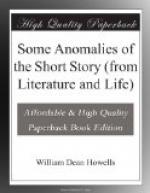by William Dean Howells
SOME ANOMALIES OF THE SHORT STORY
The interesting experiment of one of our great publishing houses in putting out serially several volumes of short stories, with the hope that a courageous persistence may overcome the popular indifference to such collections when severally administered, suggests some questions as to this eldest form of fiction which I should like to ask the reader’s patience with. I do not know that I shall be able to answer them, or that I shall try to do so; the vitality of a question that is answered seems to exhale in the event; it palpitates no longer; curiosity flutters away from the faded flower, which is fit then only to be folded away in the ‘hortus siccus’ of accomplished facts. In view of this I may wish merely to state the problems and leave them for the reader’s solution, or, more amusingly, for his mystification.
I.
One of the most amusing questions concerning the short story is why a form which is singly so attractive that every one likes to read a short story when he finds it alone is collectively so repellent as it is said to be. Before now I have imagined the case to be somewhat the same as that of a number of pleasant people who are most acceptable as separate householders, but who lose caste and cease to be desirable acquaintances when gathered into a boarding-house.
Yet the case is not the same quite, for we see that the short story where it is ranged with others of its species within the covers of a magazine is so welcome that the editor thinks his number the more brilliant the more short story writers he can call about his board, or under the roof of his pension. Here the boardinghouse analogy breaks, breaks so signally that I was lately moved to ask a distinguished editor why a book of short stories usually failed and a magazine usually succeeded because of them. He answered, gayly, that the short stories in most books of them were bad; that where they were good, they went; and he alleged several well-known instances in which books of prime short stories had a great vogue. He was so handsomely interested in my inquiry that I could not well say I thought some of the short stories which he had boasted in his last number were indifferent good, and yet, as he allowed, had mainly helped sell it. I had in mind many books of short stories of the first excellence which had failed as decidedly as those others had succeeded, for no reason that I could see; possibly there is really no reason in any literary success or failure that can be predicted, or applied in another Base.




